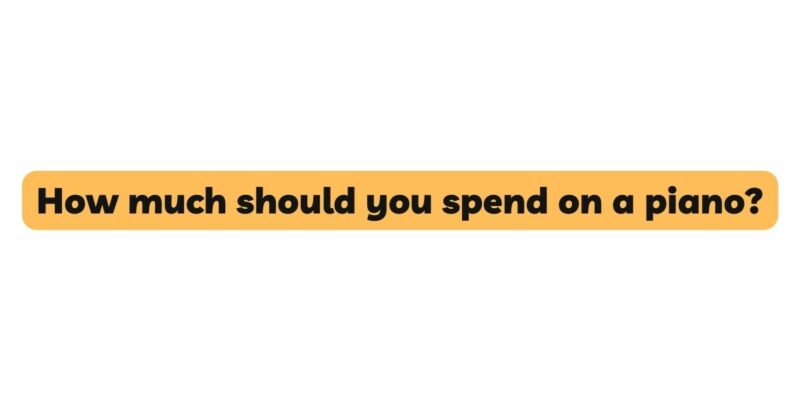Pianos are one of the most popular musical instruments in the world, and they can be a significant investment. But how much should you spend on a piano? The answer depends on a number of factors, including your budget, your playing level, and your needs.
Here is a general breakdown of how much you can expect to spend on a piano:
- Upright pianos: Upright pianos are typically less expensive than grand pianos. You can expect to pay anywhere from $1,000 to $10,000 for an upright piano.
- Grand pianos: Grand pianos are more expensive than upright pianos. You can expect to pay anywhere from $5,000 to $100,000 for a grand piano.
Of course, the price of a piano can vary depending on a number of factors, including the brand, the quality of the materials, and the features of the piano. For example, a piano made by a well-known brand will typically be more expensive than a piano made by a lesser-known brand. Additionally, a piano with a high-quality soundboard and action will be more expensive than a piano with lower-quality materials.
If you are a beginner, you may not need to spend a lot of money on a piano. A good quality upright piano in the $1,000 to $5,000 range will be sufficient for your needs. However, if you are a serious pianist or if you plan on playing the piano professionally, you may want to consider investing in a more expensive grand piano.
Here are some additional factors to consider when deciding how much to spend on a piano:
- Your budget: How much money are you willing to spend on a piano?
- Your playing level: How serious are you about playing the piano?
- Your needs: What do you need the piano for? Will you be using it for lessons, practice, or performance?
- The brand: Some brands of pianos are more expensive than others. Do some research to see which brands are known for their quality and performance.
- The quality of the materials: The quality of the materials used to make the piano will affect the sound and longevity of the instrument.
- The features: Some pianos have additional features, such as pedals, that can add to the cost. Consider your needs and decide which features are important to you.
Ultimately, the decision of how much to spend on a piano is a personal one. You need to weigh your budget, your playing level, and your needs to decide what is the right amount for you.
Here are some additional tips for buying a piano:
- Do your research: Before you buy a piano, it is important to do your research and learn about the different types of pianos and brands available. This will help you make an informed decision about which piano is right for you.
- Try out different pianos: Once you have done your research, it is important to try out different pianos to see which one you like the best. This will help you get a feel for the different sounds and feels of different pianos.
- Buy from a reputable dealer: When you are ready to buy a piano, it is important to buy from a reputable dealer. This will ensure that you get a quality instrument and that you have a good warranty in case something goes wrong.
- Get it tuned regularly: Once you have bought a piano, it is important to get it tuned regularly. This will help to keep the piano in good condition and ensure that it sounds its best.
Buying a piano is a big investment, but it can be a rewarding experience. By following these tips, you can find the perfect piano for your needs and budget.


